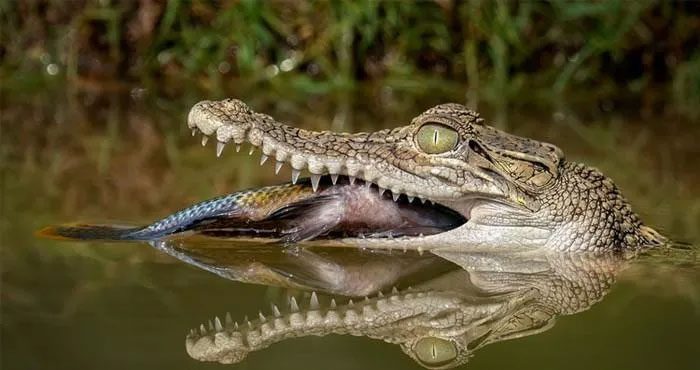Crocodile tears are a false, insincere expression of emotion, akin to a hypocrite shedding fake tears of sorrow. However, the truth is that crocodiles can indeed shed tears.
When someone pretends to be sad or displays insincere remorse, they are said to be shedding “crocodile tears.” This idiom is often associated with the feigned expression of emotions such as regret, sadness, and sympathy. While many consider this phrase merely a metaphor, crocodiles actually do shed tears when swallowing their prey. But why do crocodiles cry?
Scientists have conducted research to answer this question. However, in the early 18th century, Johann Jakob, a Swiss physician and naturalist, claimed that the common belief that crocodiles cry when they eat is inaccurate. In 1927, another scientist named George Johnson rubbed onions and salt into the eyes of a crocodile to test whether they would cry. When they did this, the crocodile did not shed a single tear, leading Johnson to conclude that the popular concept of crocodile tears is a myth.
However, many years later, in 2006, D. Malcolm Shaner, a neuroscientist, and Kent A. Violet, a zoologist, finally captured footage of 5 out of 7 members of a crocodile family shedding tears while eating.
According to How Stuff Works, crocodiles can cry just like humans and many other animals, but uniquely, they cry while consuming their freshly killed prey.
The biological mechanism explaining this behavior in crocodiles remains a mystery, as scientists face significant challenges when conducting experiments. Crocodiles become very dangerous if anyone attempts to approach them. They often reside in water, making it difficult to test whether their eyes are wet.

Crocodile tears (or superficial sympathy, pretentiousness, and insincerity) are a false, insincere expression of emotion, akin to a hypocrite shedding fake tears of sorrow. This phrase originates from an ancient belief that crocodiles shed tears when consuming their prey, and thus appears in many modern languages, particularly in Europe.
Do crocodiles cry out of sympathy for their prey?
In a 2006 study, scientists at the University of Florida and the University of California trained 7 crocodiles to move to a dry eating location, then filmed their reactions.
The results showed that 5 out of the 7 crocodiles shed tears while eating. However, these were not tears of remorse or regret. This observation led to the origin of the phrase “crocodile tears.” But if crocodiles are not sad when eating their prey, why do they cry?
The common myth suggests that crocodiles cry when they eat human flesh. In reality, the truth is quite different. Crocodiles hiss and grunt a lot while feeding, which causes air to pass through their sinuses, leading to the tear film (a thin layer that keeps tears in place) in their eyes being expelled from the tear ducts. The tear film surrounds the outer surface of a crocodile’s eye and prevents the natural evaporation of tears to keep the eyes moist. This is also what causes crocodiles to shed tears.
Researchers have also noted the phenomenon of bubbling in the eyes of some crocodiles while they chew their food. This is also a result of the reaction of tears with substances like proteins. Furthermore, the tear film of crocodiles is particularly effective compared to that of humans. The reason behind this is the excessive amount of proteins, mucus, and electrolytes. Thus, a crocodile can go for two hours without blinking, while an average human blinks about 15 times per minute to keep their eyes moist.
Another interesting fact about crocodile tears is that they serve as a rich source of nutrients for some organisms. For example, species like butterflies and bees have been observed to consume crocodile tears for their mineral content.

While crocodiles have tear ducts, they cry to lubricate their eyes, especially when they have been out of the water for an extended period, causing their eyes to begin to dry out. However, evidence suggests that this can also be triggered while eating. Bogorad syndrome is a condition that causes individuals to shed tears when consuming food, thus earning the label “crocodile tear syndrome” related to the legend.
How did the phrase “crocodile tears” originate?
The earliest print reference to crocodile tears may be traced back to the travel memoirs of Sir John Mandeville, first circulated in 1357.
However, the first metaphorical mention of crocodile tears is attributed to Edmund Grindal (Archbishop of York and Canterbury). In 1563, he wrote, “I began to be afraid, for I feared that his humility… was a false humility, and his crocodile tears were flowing.” The same sentiment was reprinted in 1711 in Strype’s Life of Grindal.
Shakespeare also referenced crocodile tears in several of his plays, including Othello (1603).




















































